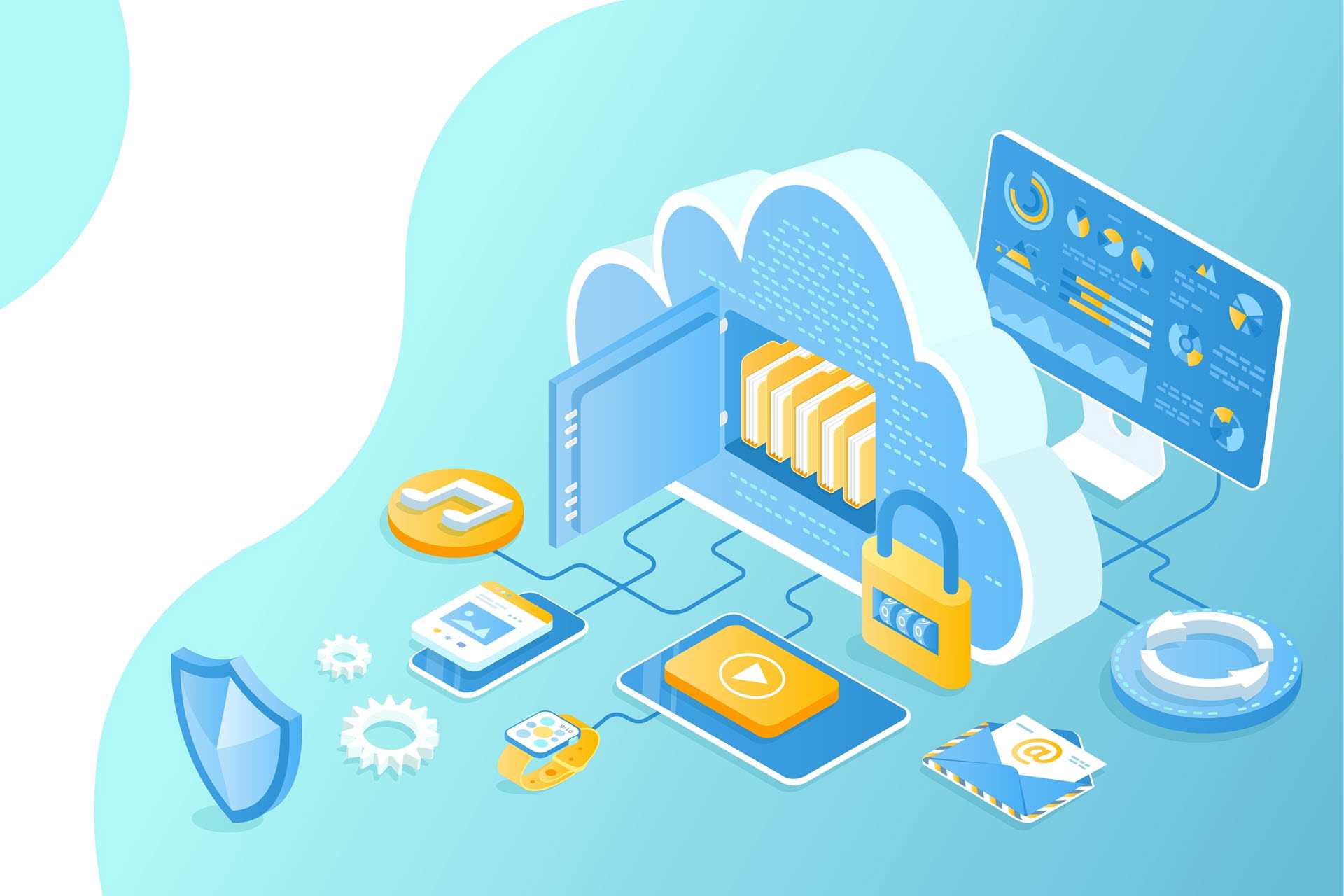Cloud computing has become a necessity for businesses that want to make their business processes as efficient as possible. The flexibility and scalability of the cloud bring many advantages, but migrating to the cloud also comes with challenges.
One of those challenges is cloud security.
As cloud environments become more complex, the number of attack vectors that cyber criminals can exploit increases. Cloud environments and users contend with data breach attempts, system vulnerabilities, and unauthorized access events, which require them to develop robust cloud security solutions.
This article explains everything you need to know about cloud security, including best practices and the possible challenges organizations face while implementing and managing cloud security.

What is Cloud Security?
Cloud security refers to a collection of procedures, technologies, and guidelines that protect sensitive data and applications stored in cloud infrastructures. Its protocols focus on the physical and logical security of customer data, devices, networks, and servers.
Cloud environments commonly take three forms:
- Public cloud, offered by cloud service providers (CSPs). The most common types of services CSPs provide are Infrastructure as a Service (IaaS), Platform as a Service (PaaS), and Software as a Service (SaaS).
- Private clouds, environments hosted exclusively for or by a single organization.
- Hybrid clouds, a combination of public and private clouds.
Depending on the cloud model used, specific cloud security measures are primarily the responsibility of either the CSP or the customer. In practice, however, responsibility for maintaining the integrity of the cloud environment is never the exclusive domain of one party. Rather, cloud service providers and customers work together to implement and maintain security best practices that ensure the inviolability of data, services, and applications.
Deploy confidential computing with phoenixNAP’s IaaS solutions for peace of mind, knowing your data is protected at rest, in transit, and in use.
How Does Cloud Security Work?
Cloud security relies on the shared responsibility model, which means that cloud service providers (CSPs) and customers play a role in maintaining safety in the cloud. While CSPs protect the cloud in terms of infrastructure, networks, and servers, customers take care of the security of their data, applications, and access management.
The following table compares the role of CSPs with the role of customers in ensuring cloud security, depending on the cloud computing service model.
| Cloud Computing Service Model | CSP Responsibility | Customer Responsibility |
| Infrastructure as a Service (IaaS) | Securing the infrastructural blocks of the cloud, including data centers, storage, servers, and networks. | Securing data through encryption and backups, access management and multi-factor authentication, and application security. |
| Platform as a Service (PaaS) | Maintaining network security; patching underlying software; monitoring for vulnerabilities. | Customizing configurations of the network, data, and applications; enforcing secure coding practices; configuring user roles and permissions. |
| Software as a Service (SaaS) | Ensuring application, storage, and network security; managing user authentication and authorization, and encryption of data in rest and backups. | Securing data in-use, user access, API usage, and data transfers; providing endpoint security. |
Benefits of Cloud Security
Maintaining cloud security means that CSPs and customers partner up to build robust solutions that protect their assets in the cloud environment.

Implementing cloud security practices ensures the following:
- Data protection: Cloud security solutions are specifically designed to ensure data security through access control and data loss prevention. The data remains confidential and protected from unauthorized access both at rest and in transit.
- Access management: Cloud security implements multi-factor authentication to ensure only authorized individuals can access the cloud.
- Real-time threat detection: Advanced CSPs provide real-time monitoring and automated alerts for protection from cyber attacks, such as DDoS attacks and SQL injections.
- Cost efficiency: Cloud security helps organizations eliminate the costs of setting up and maintaining a complex security infrastructure on-premise. Instead, this is handled by CSPs in accordance with the highest industry standards.
- Cloud compliance: Cloud security solutions often align with international and industry regulatory requirements. However, organizations must remain vigilant as regulations frequently change.
- Scalability: Cloud security solutions are easy to scale, no matter the size of the business. If necessary, security measures are expanded to cover a growing infrastructure without making significant changes to the cloud architecture.
- Network security: Cloud security ensures safe data flow between devices and servers through firewalls, encryption, and VPNs.
- Application security: Applications are protected with firewalls and vulnerability scanning that secures users’ data.
- Endpoint security: Cloud security protects endpoint devices such as smartphones, tablets, and laptops to ensure secure access to the cloud.
- Centralized security: Cloud monitoring solutions analyze potential threats to multiple entities from a centralized place. This enables timely software updates, establishing disaster recovery plans, and securing protection on all devices.
- Redundancy and availability: Cloud security ensures continuity by making the cloud services available even if some components experience failure.
Cloud Security Implementation: Challenges and Concerns
Organizations wishing to level up their cloud security can expect to meet the following challenges:
- Complexity: Cloud management requires specific solutions across public and private providers, platforms, and deployments, complicating the operational efficiency of your business. Smoothly integrating every aspect of the cloud can be difficult to achieve.
- Limited visibility: The visibility of cloud solutions compared to on-prem setups can be limited. Using third-party solutions removes transparency and may affect the organization’s ability to control data and operations.
- Misconfigurations: Lack of expertise leads to misconfigurations that can cause data breaches and security concerns. For example, not configuring privacy settings properly or leaving administrative passwords instead of changing them may cause serious harm to data security.
- Multicloud and hybrid cloud: Using multiple cloud providers or a combination of cloud and on-prem solutions creates difficulties with the implementation of consistent security measures across these different environments.
- Changing workloads: Managing fluctuating workloads is a common issue in cloud management. This becomes a concern when cloud solutions are not designed to adapt to these changes.
- Shared responsibility confusion: CSPs and customers have different responsibilities in maintaining cloud security, and customers are sometimes not well acquainted with their part. Misunderstandings create confusion, potential security gaps, and even compliance breaches.
- Insecure access: Hackers always search for weak points in the public cloud to exploit and interfere with data and operations. This is especially risky for companies that allow access to their systems from all devices and locations.
- Vendor lock-in: Relying on the tools of one cloud provider can make it difficult to adopt advanced security solutions or migrate to other platforms.
- Escalating costs: Despite cloud solutions being cost-effective, these expenses can quickly escalate as new services, tools, and staff are deployed.
- Timely incident response: The complexity and lack of visibility of cloud environments can make it difficult to respond promptly and adequately to security incidents. Appropriate cloud incident response requires specialized skills and a unique incident response plan that successfully addresses the intricacies of cloud environments.
As an alternative cloud provider, phoenixNAP eliminates the complexity and skyrocketing costs associated with hyperscalers by providing you with the cloud services that fit your specific needs. Regain control over your cloud environment while maintaining rock-solid performance, robust security, and transparent pricing. Check out our different solutions to find the right cloud environment for your business:
Cloud Security Strategy: Best Practices

To leverage the full power and flexibility of the cloud while minimizing risks and ensuring data protection, organizations need to understand deeply the shared responsibility model and their role in maintaining cloud security.
The following best practices help to achieve a secure cloud environment:
- Employ the zero-trust model: Zero trust security contributes to higher safety of sensitive data through continuous verification of each access and transfer request.
- Always backup and encrypt data: Data integrity in case of cyber attacks is ensured by implementing a robust backup strategy and encrypting sensitive information.
- Create strong credentials: Urge employees to create strong passwords and not share them with anyone, even if someone is posing as trusted individual or IT personnel.
- Continuously monitor and audit systems: Monitor and log all activities in the cloud environment to make it easier to detect potential attacks. Frequently test for vulnerabilities and misconfigurations to ensure your cloud security is up to date.
- Enable multi-factor authentication (MFA): Always ask for additional confirmation when someone is attempting access to sensitive data or systems.
- Apply endpoint security: Endpoint security tools protect from phishing, malware, and other threats all the devices used to access business information, operating systems, and software.
- Have a cloud-specific incident response plan: Make sure the incident response plan is able to address the particular nature of the cloud; regularly test it to ensure it is effective.
- Train employees: Security awareness training tests employees’ knowledge on the latest cloud security threats and teaches them how to avoid risky behavior and recognize malicious activity.
- Check for compliance: Know industry-specific and regional compliance mandates and regularly audit your cloud environment for possible breaches.
For more information, check out our in-depth guide to developing and implementing a cloud security strategy and a detaild cloud security best practices and tips.
Navigating the Cloudscape
As cyber attacks become a frequent practice in the cloud environment, the pressure is on companies and service providers to design intelligent solutions and protect sensitive data. Cloud security is based on the shared responsibility model, which relies on cloud service providers and customers actively contributing to this goal. By combining their efforts, CSPs and businesses create a safer cloud landscape for all.



